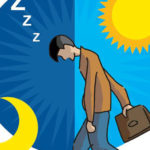 During this outbreak of coronavirus, shift workers such as doctors, nurses, Gardai and other front line workers are under more pressure than ever. It has never been more important for them to stay healthy while they are doing the heroic job of looking after our safety and well-being. This article discusses some diet and lifestyle tips that can help this population group.
During this outbreak of coronavirus, shift workers such as doctors, nurses, Gardai and other front line workers are under more pressure than ever. It has never been more important for them to stay healthy while they are doing the heroic job of looking after our safety and well-being. This article discusses some diet and lifestyle tips that can help this population group.
Circadian Rhythm
Circadian rhythms are physical, mental, and behavioural changes that follow a daily cycle. They are cycles that tell us when to sleep, wake and eat. When it’s dark at night, your eyes send a signal to the hypothalamus that it’s time to feel tired. Your brain, in turn, sends a signal to your body to release melatonin, which is our sleep hormone. That’s why your circadian rhythm tends to coincide with the cycle of daytime and night-time, and this is how it works best. For shift workers working though the night and then trying to sleep during the day, this rhythm gets dysregulated and can result in adverse health outcomes.
Other issues for shift workers
- Eating at night can often have an adverse impact on digestion and, as a consequence, absorption of vitamins and minerals
- Shift workers may not have access to nutritious meals and snacks. Even if they do bring their own, they may not have time in their busy shift to eat it
- Shift work can interfere with the normal production of cortisol which can be detrimental to blood glucose and immune function
- There can also be a big social aspect – shift workers often don’t get to eat meals with their family
Diet tips
- Stick to a normal intake of 3 main meals and 2-3 snacks over a 24-hour period but avoid large meals between midnight and 6am.
- Bring healthy meals and snacks to work with you if you can
- Have a light snack before bed – remember, it will be harder to sleep if you are either too full or too hungry
- Skip the sugar – it may give you a quick burst of much needed energy, but it is always followed by a crash
- Watch your caffeine intake, like sugar it will give you a quick burst of energy, but it may impact on your sleep when you finally do get to bed.
- drink plenty of water throughout your shift
Lifestyle tips
- Go for a short walk, relax with a book and/or take a hot bath before going to bed
- Avoid vigorous exercise before sleep as it is stimulating and raises the body temperature
- Avoid blue light exposure too close to bed, this can interfere with melatonin production. You can download apps like F.lux or purchase some funky blue light blocking amber glasses if you do need to use a screen late at night
- Exposure to daylight is so important for circadian rhythm so, where you can, try and get some daylight exposure
If you would like nutritional support during these challenging times, call us on 01 2655977 or book online now.

